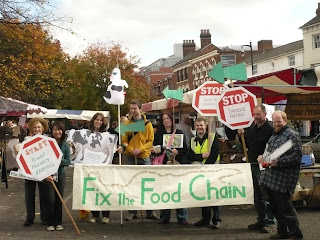Last month Birmingham Friends of the Earth went into the countryside to celebrate Open Farm Sunday, an annual event aimed at increasing people’s knowledge and access to farms and farming. Having previously visited an organic farm in Worcestershire, for this day we went into Shropshire to two farms, Hungersheath and Fordhall Farm.
Hungersheath is a small mixed farm with farm shop, tea rooms and 3 acres of pick your own. It has specialised in its asparagus crops for many years and to celebrate this was offering free tastings of a range of asparagus-based dishes. Cream cheese and asparagus terrine, pea and asparagus mousse, and cheese and asparagus muffins were just some of the delights on offer to sample. We picked up some great ideas on interesting things to make with a seasonal, local crop and stocked up on spears from the local shop in order to try out the recipes for ourselves when we got home. We also had a good walk around, saw the animals and had a chat with the farmers there.
Our second visit of the day was to Fordhall Farm – England’s first community owned farm, with over 8000 shareholders. This farm has been organic for over 65 years and is part-owned by some BFOE members. For Open Farm Sunday there was a beer festival on offer with live music as well as a host of fun activities including welly wanging, archery and some birds of prey. There was also a large range of different stalls selling a range of produce offering the opportunity to taste wares, including some particularly memorable brie. The weather had been ominous all day and before we had managed to see everything on offer there was a torrential downpour that saw us sheltering in the farm shop before making a run for it. It was a shame that we didn’t get the chance to learn even more about this exciting venture but we did at least get a cider in before the rain started.
BFOE is very involved in the national Fix the Food Chain campaign and part of this is about building alliances with farmers and trying to promote alternatives to intensive factory farming. It was really interesting to visit these places and learn more about the people and the methods used for planet-friendly farming. With the second reading of the Sustainable Livestock Bill due in November, it is really exciting to think that farms such as these could be supported much more in the future and will hopefully become a more common sight across the country.
Roxanne Green










